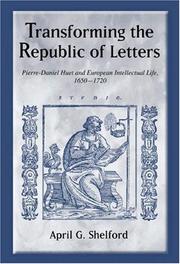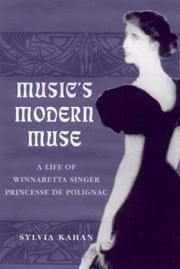| Listing 1 - 4 of 4 |
Sort by
|
Book
ISBN: 3837644294 3839444292 Year: 2018 Publisher: Bielefeld transcript Verlag
Abstract | Keywords | Export | Availability | Bookmark
 Loading...
Loading...Choose an application
- Reference Manager
- EndNote
- RefWorks (Direct export to RefWorks)
Bis heute hält die Forschung an der negativen Perspektivierung höfischer Moralistik fest, an einer pessimistischen Anthropologie im Zeichen des amour-propre. Mit ihrer literaturwissenschaftlichen Untersuchung zur Konversation und Geselligkeit im französischen Salon zeigt Karin Schulz eine optimistische Lesart, welche die sozial-reflexive Produktivität moralistischen Denkens stärkt. Auf der methodischen Grundlage der Erfahrungsdifferenz von Idealität und Realität hinterfragt sie das Selbstverständnis idealer Verhaltensnormen und zeichnet für den französischen Salon, ausgehend vom 17. Jahrhundert, eine Geschichte der konversationellen Programmatik mit Ausblick auf die Lehren kommunikativer Gegenwart.
Literary studies: general --- Communication. --- Cultural History. --- French Literature. --- French Salon Culture. --- General Literature Studies. --- Literary Studies. --- Literature. --- Moralistic Literature. --- Reality. --- Romance Studies. --- Konversation; Französische Salonkultur; Moralistik; Soziale Performanz; Handlungsideal; François de La Rochefoucauld; Marcel Proust; Idealität; Realität; Verhaltensnorm; Angemessenheit; Kommunikation; Soziale Interaktion; Geselligkeit; Amour-propre; Literatur; Kulturgeschichte; Französische Literatur; Allgemeine Literaturwissenschaft; Romanistik; Literaturwissenschaft; Conversation; French Salon Culture; Moralistic Literature; Reality; Communication; Literature; Cultural History; French Literature; General Literature Studies; Romance Studies; Literary Studies
Book
ISBN: 9781783273904 9781787445345 1787445348 1783273909 Year: 2019 Publisher: Woodbridge, Suffolk, UK ; Rochester, NY : The Boydell Press,
Abstract | Keywords | Export | Availability | Bookmark
 Loading...
Loading...Choose an application
- Reference Manager
- EndNote
- RefWorks (Direct export to RefWorks)
This collection explores the idea of music in the salon during the long nineteenth century, both as a socio-cultural phenomenon, and as a source of artistic innovation and exchange. Drawing on a wide range of scholarly approaches, this book uses the idea of the salon as a springboard to examine issues such as gender, religion, biography and performance; to explore the ways in which the salon was represented in different media; and to showcase the heterogeneity of the salon through a selection of case studies. It offers fresh considerations of familiar salons in large cultural centres, as well as insights into lesser-known salons in both Europe and the United States. Bringing together an international group of scholars, the collection underscores the enduring impact of the European musical salon.
78.27 --- Music --- Music in the home --- Home --- Manners and customs --- Art music --- Art music, Western --- Classical music --- Musical compositions --- Musical works --- Serious music --- Western art music --- Western music (Western countries) --- Social aspects --- History --- Europe. --- Musical salon culture. --- United States. --- artistic innovation. --- case studies. --- gender. --- long nineteenth century. --- performance. --- socio-cultural phenomenon. --- Salons --- Europe --- United States --- Intellectual life

ISBN: 9781580462433 158046243X 9781580466899 9786612080654 1282080652 1580466893 Year: 2007 Publisher: Rochester, N.Y. University of Rochester Press
Abstract | Keywords | Export | Availability | Bookmark
 Loading...
Loading...Choose an application
- Reference Manager
- EndNote
- RefWorks (Direct export to RefWorks)
Early modern Europe's most extensive commonwealth -- the Republic of Letters -- could not be found on any map. This republic had patriotic citizens, but no army; it had its own language, but no frontiers. From its birth during the Renaissance, the Republic of Letters long remained a small and close-knit elite community, linked by international networks of correspondence, sharing an erudite neo-Latin culture. In the late seventeenth century, however, it confronted fundamental challenges that influenced its transition to the more public, inclusive, and vernacular discourse of the Enlightenment.
Transforming the Republic of Letters is a cultural and intellectual history that chronicles this transition to "modernity" from the perspective of the internationally renowned scholar Pierre-Daniel Huet (1630-1721). Under Shelford's direction, Huet guides us into the intensely social intellectual world of salons, scientific academies, and literary academies, while his articulate critiques illumine a combative world of Cartesians versus anti-Cartesians, ancients versus moderns, Jesuits versus Jansenists, and salonnières versus humanist scholars. Transforming the Republic of Letters raises questions of critical importance in Huet's era, and our own, about defining, sharing, and controlling access to knowledge.
April G. Shelford is Assistant Professor in the History Department at American University, Washington, D.C.
History of civilization --- Huet, Pierre Daniel --- Huet, Pierre-Daniel, --- Europe --- Intellectual life --- 930.85 <4> --- 929 HUET, DANIEL --- Cultuurgeschiedenis. Kultuurgeschiedenis--Europa --- Biografie. Genealogie. Heraldiek--HUET, DANIEL --- Huet, Pierre Daniel, --- Huet, Peter Daniel, --- Huetius, Petrus Daniel, --- Huet, Daniel, --- Huet, --- Council of Europe countries --- Eastern Hemisphere --- Eurasia --- -Intellectual life --- -930.85 <4> --- 929 HUET, DANIEL Biografie. Genealogie. Heraldiek--HUET, DANIEL --- -History of civilization --- Huet, Daniel --- Huetius, Petrus Danielis --- -929 HUET, DANIEL --- HISTORY / Modern / 17th Century. --- Access to Knowledge. --- Cartesians. --- Cultural History. --- Early Modern Europe. --- Enlightenment. --- Intellectual Transformation. --- International Networks. --- Jesuits. --- Knowledge. --- Pierre-Daniel Huet. --- Republic of Letters. --- Salon Culture.

ISBN: 1580463339 1281741159 9786611741150 1580466524 1580461336 Year: 2003 Publisher: Rochester, NY : University of Rochester Press,
Abstract | Keywords | Export | Availability | Bookmark
 Loading...
Loading...Choose an application
- Reference Manager
- EndNote
- RefWorks (Direct export to RefWorks)
The American-born Winnaretta Singer (1865-1943) was a millionaire at the age of eighteen, due to her inheriting a substantial part of the Singer Sewing Machine fortune. Her 1893 marriage to Prince Edmond de Polignac, an amateur composer, brought her into contact with the most elite strata of French society. After Edmond's death in 1901, she used her fortune to benefit the arts, science, and letters. Her most significant contribution was in the musical domain: in addition to subsidizing individual artists (Boulanger, Haskil, Rubinstein, Horowitz) and organizations (the Ballets Russes, l'Op©♭ra de Paris, l'Orchestre Symphonique de Paris), she made a lifelong project of commissioning new musical works from composers, many of them unknown and struggling, to be performed in her Paris salon. The list of works created as a result is long and extraordinary: Stravinsky's Renard, Satie's Socrate, Falla's El Retablo de Maese Pedro, and Poulenc's Two-Piano and Organ Concertos are among the best-known titles. In addition, her salon was a gathering place for luminaries of French culture such as Proust, Cocteau, Monet, Diaghilev, and Colette. Many of Proust's memorable evocations of salon culture were born during his attendance at concerts in the Polignac music room. Sylvia Kahan brings to life this eccentric and extravagant lover of the arts, whose influence on the 20th Century world of music and literature remains incalculable.
Music patrons --- Polignac, Winnaretta, --- Patrons, Music --- Benefactors --- De Polignac, Edmond, --- De Polignac, Winnaretta, --- De Scey-Monbéliard, Winnaretta, --- Monbéliard, Winnaretta de Scey-, --- Polignac, Edmond, --- Scey-Monbéliard, Winnaretta, --- Singer-Polignac, Winnaretta, --- Singer, Winnaretta Eugénie, --- France. --- Bro-C'hall --- Fa-kuo --- Fa-lan-hsi --- Faguo --- Falanxi --- Falanxi Gongheguo --- Farans --- Farānsah --- França --- Francia (Republic) --- Francija --- Francja --- Francland --- Francuska --- Franis --- Franḳraykh --- Frankreich --- Frankrig --- Frankrijk --- Frankrike --- Frankryk --- Fransa --- Fransa Respublikası --- Franse --- Franse Republiek --- Frant͡ --- Frant͡s Uls --- Frant͡sii͡ --- Frantsuzskai͡a Rėspublika --- Frantsyi͡ --- Franza --- French Republic --- Frencisc Cynewīse --- Frenska republika --- Furansu --- Furansu Kyōwakoku --- Gallia --- Gallia (Republic) --- Gallikē Dēmokratia --- Hyãsia --- Parancis --- Peurancih --- Phransiya --- Pransiya --- Pransya --- Prantsusmaa --- Pʻŭrangs --- Ranska --- República Francesa --- Republica Franzesa --- Republika Francuska --- Republiḳah ha-Tsarfatit --- Republikang Pranses --- République française --- Tsarfat --- Tsorfat --- Cocteau. --- Colette. --- French culture. --- Paris salon. --- Proust. --- Ravel. --- Singer Sewing Machine fortune. --- Stravinsky. --- Winnaretta Singer-Polignac. --- arts. --- letters. --- musical domain. --- musical works. --- organizations. --- salon culture. --- science. --- subsidizing artists.
| Listing 1 - 4 of 4 |
Sort by
|

 Search
Search Feedback
Feedback About UniCat
About UniCat  Help
Help News
News